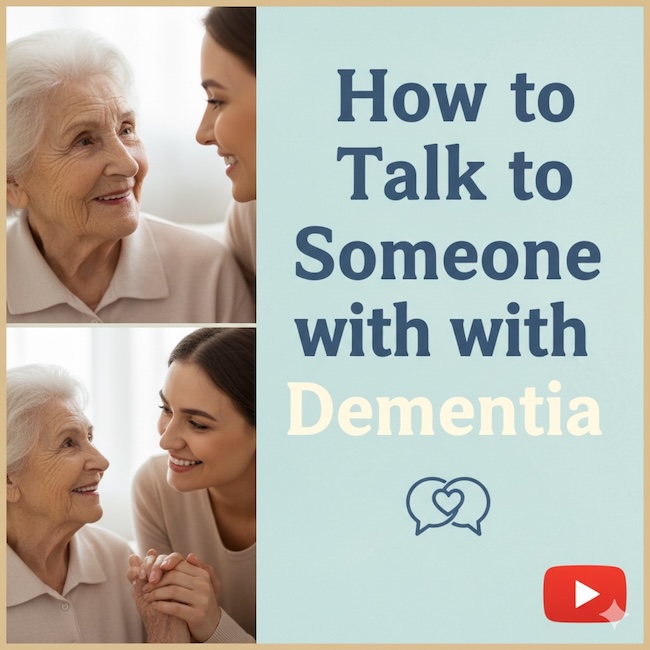
Reminders and reason just won’t work
When caring for an older adult with Alzheimer’s or dementia, it’s instinctive to try to bring them back into reality. When they say something that doesn’t make sense, you'll want to remind them of the facts or ask them to remember previous conversations or events.
What most caregivers don’t know is that this approach often makes the situation worse.
Logical explanations cause agitation and anger
Having Alzheimer’s or dementia is scary and confusing for your older adult. Using logic and reason to explain why you're right and they're wrong is likely to make them agitated, defensive, angry, or act out with difficult behavior.
Instead, the best thing you can do is not try to bring them back into reality.
Do’s and don’ts for how to respond
When your senior says something that doesn’t make sense or is completely untrue, use these do’s and don’ts to help you respond in a way that keeps them calm. These tips have been tried and tested by an Alzheimer’s support group leader with 20+ years of experience.
DO
- Respect and join them in their new reality – it's the one their brain has created
- Respond to the emotion or intention behind the words
- Gently distract them with an activity they enjoy
- Redirect the conversation to a pleasant, positive, or neutral topic
- Use therapeutic fibbing – agree with things that aren’t true or bend the truth in harmless ways if it calms the situation
- Without words, find ways to assure them that they’re safe and cared for – hugs or gentle touching often works well
DON’T
- Force them to live in our reality
- Respond with logic and reason
- Pay strict attention to their words – they may not actually mean what they say
- Keep trying to convince them to see or do things your way
- Say “Don’t you remember?”
- Say “No, you’re wrong.”
- Say “Don’t do that.”
- Tell them that people they’re talking about or wanting to see have already passed away
Don’t be discouraged if your attempts to soothe or redirect don’t work every time. This is a skill that improves with practice. In time, you’ll figure out what works best for your senior.
Bottom line
Using reason and logic to explain reality to someone with Alzheimer’s or dementia doesn’t work. Paying attention to the emotions rather than the words helps you uncover their true needs.
Instead of arguing, shift the mood to something more calm and positive. You’ll thank yourself when you don’t have to get into the same screaming match for the 38th time.
Recommended for you:
— 3 Ways to Respond When Someone with Alzheimer’s Says I Want to Go Home
— Q & A: Should You Correct Someone with Alzheimer’s?
— Dealing with Difficult Alzheimer’s and Dementia Symptoms
By DailyCaring Editorial Team
Image: merrymakers
About the Author

Connie is the founder of DailyCaring.com and was a hands-on caregiver for her grandmother for 20 years. (Grandma made it to 101 years old!) She knows how challenging, overwhelming, and all-consuming caring for an older adult can be. She also understands the importance of support, especially in the form of practical solutions, valuable resources, and self-care tips.














My daughter found this site for us. Right away I found an answer to many of questions. Wonderful place to visit when I need help. Thanks for your advise on this illness. Very grateful. Will be here again for sure. GOD bless you.
We’re so glad to hear that our articles are helpful! We very much appreciate your kind comments, thank you 💜
My mother in law has moments of normalcy. But because it is so intertwined with the hallucinatory remarks I am never sure how to respond. What is certain is that if she is occupied she doesnt go down the road of “why am I here?” Etc it’s usually asked when she’s not doing anything.
I’m sorry this is happening. It’s normal for someone with dementia to sometimes be/seem “normal” and other times be noticeably disoriented. It may be helpful to get familiar with the stages of dementia and common symptoms — https://dailycaring.com/3-stages-of-dementia-what-to-expect/
To help you find ways to respond when she asks why she’s there, these articles may be helpful. Even if your mother-in-law isn’t asking about going home, the concept of feeling like she’s not in the right place is similar:
— https://dailycaring.com/when-someone-with-alzheimers-says-i-want-to-go-home/
— https://dailycaring.com/3-ways-to-respond-when-someone-with-alzheimers-says-i-want-to-go-home/
— https://dailycaring.com/4-ways-to-respond-when-someone-with-alzheimers-keeps-repeating-questions/
It’s great that you noticed that she seems to ask this when she’s not occupied. Finding soothing, no-fail activities that she enjoys is a great way to keep her happily occupied and reduce her anxiety or fixation on why she’s there. Here are some activity suggestions:
— https://dailycaring.com/12-engaging-activities-for-seniors-with-dementia-reduce-agitation-boost-mood/
— https://dailycaring.com/10-fun-failure-free-activities-for-people-with-dementia/
— https://dailycaring.com/4-reasons-dementia-activities-are-important-and-5-ways-to-adapt-everyday-tasks/
Hi, my husband has Lewy Body dementia. He hallucinates badly most of the time. The worst thing for me, and the hardest for me to handle, is that he “sees” me having sex with one of these hallucinations! I have no answer. If I agree, then I’m admitting to having sex with another man, if I deny it, he “knows” that I’m lying because he “saw” me. It’s usually when I’m sitting quietly on my own after he goes to bed, when I’m watching tv, reading or doing puzzles. He comes out and gets furious with me, calling me all sorts of names and calling me a liar. Any suggestions please?
Christine
I’m so sorry this is happening, it’s a really tough situation 🙁 It’s true that there isn’t a great answer when he accuses you of cheating. If possible, try to give him a hug or sit with him to soothe him. Try to respond to the emotions rather than the literal words. It may also be helpful to experiment with ways to reduce the chances that he will have this hallucination.
One possibility is that these thoughts could be triggered by a feeling of anxiety, insecurity, or being a burden because of the changes in your relationship caused by the dementia. That may lead his brain to dwell on the topic. Perhaps you could try things that would reassure him of your love and commitment? Maybe cuddle with him as he falls asleep or incorporating more hugs or touching throughout the day? Another idea is to reduce his overall level of anxiety by creating a calm overall environment or creating a soothing bedtime routine with soft, soothing music or calming aromatherapy. He may also benefit from something like a weighted blanket to encourage relaxation and deep sleep — so he won’t get up after going to bed. It may take some experimentation to find solutions that improve the situation. Hang in there, this phase won’t last forever. Sending big hugs 💜
More info on the suggestions:
— http://dailycaring.com/reduce-dementia-agitation-with-a-calm-environment-5-helpful-tips/
— http://dailycaring.com/seniors-and-caregivers-improve-health-and-mood-with-aromatherapy-stress-relief/
— http://dailycaring.com/7-ways-to-reduce-dementia-sundowning-symptoms/
— http://dailycaring.com/weighted-blankets-in-dementia-care-reduce-anxiety-and-improve-sleep/
My 93 year old mother-in-law had Altzheimer’s. She asks about her mother and father (who died 40 years ago) and her husband who died 3 years ago…why they do not come to see her. I realize you are suppose to live in their reality but is it kind to let them think they are alive? Isn’t it hurtful for her to think they NEVER come to see her ? Just wondering.
These are difficult situations. It’s tough, but I do think it’s better to not correct her belief that her parents and husband are still alive. To keep her from feeling hurt (or even realizing) that they’re not visiting her, find different ways to make excuses for why they’re not there at the moment and distract her from those thoughts. For example, you might say that they’re stuck in traffic and will be there soon and then suggest a walk, snack, or another activity that she enjoys. Or, you could say something about how much they love her and help her reminisce about fun times she had with them. After talking about some positive memories with her mom, dad, and husband, transition to other pleasant conversation topics or activities.
I work in a care home where a resident is always asking where her deceased husband is. He was a scout leader so most of us say oh he’s at scouts or work etc and she goes off on her way happy. When her family come round there persist in telling her when she asks that her husband is dead which really upsets her everytime. She then spends the rest of the night distraught and really hard to respond to any care or reassurance. We have asked the family that it upsets her but they ignore us. We feel that by telling her every time she asks that her husband is dead is making her grieve over and over again. If she is happy thinking he is at scouts or work and she carries on her everyday life then I think this is the fairest kindest way.
Hi Gary, thank you for sharing your story with us! I love the way your team is able to reassure your resident and make her feel that everything is OK. That is true care! We believe that is absolutely the right thing to do when someone can no longer process the information and feelings that come up when they hear bad news. I’m so sad to hear that her family makes her so upset by telling her such sad news, again and again 🙁 Perhaps the administrator or director of nursing could sit down and explain the situation to them? Maybe hearing it from an authority figure would help? I hope they’ll come to realize that they’re not being kind by telling her the harsh reality.
This is, in fact, the best tip out there for dealing with someone with Alzheimer’s. Now, if I can just get my father to pay attention to it! My mother has late stage Alzheimer’s, and I can’t persuade dad that constantly correcting her is the wrong thing to do. I’m afraid he’s in massive denial, and thinks that if he keeps trying to correct her, one day she’ll snap out of it. They both live next to us, so I can remind him whenever I’m over there, but I can’t be over there every minute. I’m printing this out for dad to read. God bless and help us caregivers!
Thank you Donna, I’m so glad you found this article helpful! I’m sorry to hear about the situation with your dad. I hope this article can help him as well. I can certainly empathize though. It’s really tough to admit to yourself that someone you love so much has this uncurable disease with such devastating symptoms. Big hugs to you and your family!
I have a brother-in-law that does the same to my sister, it hurts me hear it!
When I talk to my sister on the phone he is listening to every thing she says and lets her know that she already asked the same question …myself I just answer the question three times as if it is the first time she asked! It is sad to see my sister with this disease…I actually have two sisters that have Alzheimer’s. They are 81 & 78…wish there was a cure. Wish they knew what causes it.
I’m so sorry that this is happening. It’s wonderful that you’re able to handle the repeated questions so calmly. Perhaps it would help your brother-in-law if he could learn more about the disease and how to respond to common behaviors. Maybe if you shared a few tips with him, he would be willing to try them?
These articles may be helpful:
— 4 Ways to Respond When Someone with Alzheimer’s Keeps Repeating Questions: https://dailycaring.com/4-ways-to-respond-when-someone-with-alzheimers-keeps-repeating-questions/
— 3 Stages of Dementia: What to Expect: https://dailycaring.com/3-stages-of-dementia-what-to-expect/
This is a great article. The one thing I want to point out is that not all people living with Alzheimer’s or some other form of dementia are “older adults”. I don’t mean to be overly sensitive, but my loved one is experiencing early onset Alzheimer’s and it’s frustrating and somewhat alienating that most of the literature available is targeted to people who are advanced in age. I’ve never been so scared in my life, and even though the information is helpful, I feel somewhat alienated.
Hi Cynthia — My apologies! We never intend to exclude younger people with Early Onset Alzheimer’s. Much of the writing available today is focused on older adults only because that covers the vast majority of people with the disease, but it’s not meant to exclude anyone.
Aside from that, I’m so glad you found this helpful and I hope you’ll still consider reading our Alzheimer’s and dementia articles. Our goal is to help anyone affected by these terrible diseases.
For additional support, I’d recommend a private Facebook group called Memory People. It was founded (and still run) by Rick Phelps, who has Early Onset Alzheimer’s. It’s an active, supportive community of kind people who are family caregivers to someone with dementia, people who have dementia, professional caregivers, and former caregivers. You’ll definitely be able to find others who are also caring for someone with Early Onset. More info here — http://dailycaring.com/alzheimers-support-group-on-facebook-memory-people/
You may also be interested in Rick Phelps’ blog — http://phelps2645.blogspot.com/
Best,
Connie
I take care of my father in law that’s 89 and also my mother which is 79 both with deminca . It’s so very hard . Iam doing the best I can , but feel so overwhelmed at times . Dads been with us for 5 years my mom 2 years. My sister was helping for a few days every month now she hasn’t been here for a while. I talk to her every day she lives about 2 hours away. I try to tell her I need her but I think it falls on deaf ears. It’s very very hard. I took on this but was told they would all help , now it’s like pulling teeth to get any help at all . How can I get them all to help just a little
Hi Kim,
I’m so glad you found our website and hope our tips are helpful. You’re doing an amazing job caring for both your father-in-law and your mother! But I agree that you need more help, it’s so draining that it’s very common to feel overwhelmed.
It’s good that your family had agreed to help. It sounds like they need to be reminded and told what kind of help they need to give. Sometimes people need you to make very specific requests. It’s not fair to you to have to do that, but hopefully it will let you get some much needed rest. Here is more info about how to get family to help — https://dailycaring.com/4-tips-get-family-to-help-with-elderly-parents/
If they’re not able to help you themselves, you may take the approach of telling them that they either can help as you ask or pay for you to hire the help you need. You could remind them how much it would cost to move them to assisted living, which they would also have to help pay for. It’s sad, but sometimes that’s what it takes to motivate people to step up and do the right thing. But you’re absolutely right to insist that they help out — you need and deserve to get more rest!!
Best,
Connie
My brother in law was just diagnosed with dementia and my sister needs a lot of help in caregiving.
I will compile these tips for her to help in dealing with her husband’s behaviour.
I’m sorry to hear about your brother-in-law and sister. She’s lucky to have a supportive sister like you.
For more articles that help with common Alzheimer’s challenges, check here — https://dailycaring.com/category/health-conditions/alzheimers-dementia/